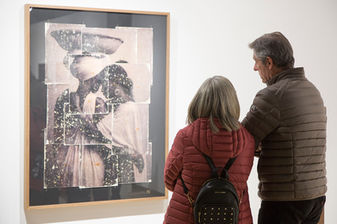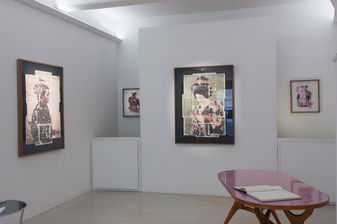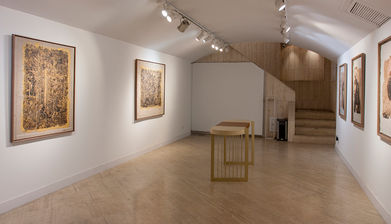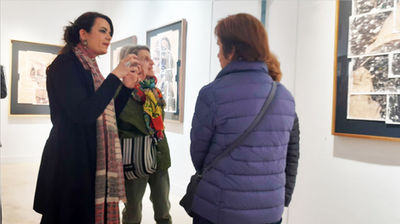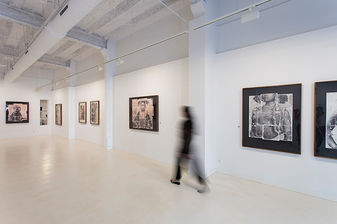Exhibitions
Here you can find information and pictures of my recent exhibitions.
Teixint Horitzons (Weaving Horizons):
There are artists who work with light and others who work with memory. Marta Fàbregas does both at once. In her works, the image is not just a reflection, but a bridge between the past and the present, between what we see and what remains hidden. “Weaving Horizons” invites us to follow this thread and look beyond what we already know.
The first part of the exhibition, “Where the Horizon Begins”, draws on old photographic archives. Fàbregas does not simply recover these images: she reimagines and recreates them using digital tools. From this process emerge female figures that symbolize strength and dignity—women carrying baskets on their heads, with their backs turned to the viewer, as if moving toward a future yet to be written. The fact that we cannot see their faces does not conceal them; it liberates them. In a world that has often reduced women to objects of the gaze, Fàbregas restores anonymity as a space of their own. These images, illed with silence and presence, speak of the burden of the past, but also of the hope that can be glimpsed on the horizon.
In the second part of the exhibition, “New Horizons”, the artist takes a step further and adopts a more pictorial and symbolic language. Here, a new element transforms her visual universe: the black background and the golden paint. Black acts as a space of origin; gold, as light and rebirth. Between these two extremes—shadow and light—a dialogue is established that reflects the artist’s inner journey.
On this background, Fàbregas transfers new images: women dressed in white who embrace, touch, or simply recognize one another. Their gestures are rituals of complicity and trust. There is no setting or artifice, only what is essential: the body, the light, the skin, the bond. In their postures we find balance and duality; in their silences, identity and mystery.
In some works, the figures appear near or in the water. The water, like the white of their garments, becomes a symbol of rebirth—a baptism without religion that evokes the idea of cleansing and liberation. In this space, time seems to stand still and the
body recovers its own truth.
In this golden world, light is memory and darkness is refuge. Everything breathes calm and intimacy. The work becomes a space of contemplation that invites us to look at ourselves differently—with more kindness, with more gentleness toward who we are.
With these pieces, Fàbregas builds a feminine genealogy made of simple gestures and eloquent silences. They are not portraits but presences; they do not tell stories but contain them. In this fabric of light and shadow, the artist creates a space where memory can be reconciled with the present.
Marta Fàbregas’s work is, at its core, a dialogue between memory and light. Each piece unites what was with what might yet be, the wound with beauty. Her practice is both poetic and political: it reminds us that art can be a form of healing, repair, and resistance. She does not seek merely to show images, but to help us look with greater awareness—to recognize the humanity hidden behind the archives.
“Weaving Horizons”, ultimately, is an act of reconstruction: a gesture of bringing back together what history once broke, with the serenity of a patient movement, like gold spreading over black to ignite a new light.
Noa Omedes
Artistic Director of the Bassat Foundation
D(ó)na Oportunitat

D(ó)na Oportunitat is an artistic mediation project by Marta Fàbregas and Berta Navarro aimed at creating dialogical bridges through reflections on new opportunities, specifically those arising when a person decides to leave their country of origin and settle in a new place. The proposal focuses on the testimonies of women in this context in Sant Cugat.
This project seeks to listen to and value personal experiences while also highlighting the opportunities generated within the social and cultural contexts in which these women are immersed. The exhibition space will function both as a gallery and as a workspace for creating the artwork. Consequently, there will be a section open to the public and another dedicated to creative work. Once the work is completed, the space will transform into a fully-fledged exhibition area.
The project was selected through the Sant Cugat Artist Cycle call, as part of the Manifesta 15+ program. From September 3rd, 2024 to November 14th, 2024.
Marta Fàbregas

Individual exhibition from April 26th, 2024 to May 18th, 2024 at the El Claustre Gallery in Girona.
In this exhibition, the artist presents more than 25 works from series such as Colonized, Kairos, Perfect Imperfections, or the Garden of the Hesperides among others.
It is the first time that the artist presents such an extensive, complete exhibition with such a variety of works.
Virtual Gallery
'Colonized' is a series of portraits of women from various walks of life—slaves, maids, mentally ill, or from lower castes. These women, humble workers or wealthy ones in their luxurious dresses, were all in one way or another colonized by society. Their identity, future, desires, and dreams were stripped away. Their freedom. These resilient women have been 'colonized' solely because of their gender. 'Colonized' is the latest project by photographer and artist Marta Fàbregas. The aim of this artistic endeavor is to dignify and exalt women as a fundamental part of human history and underscore the indispensable role of women in the development of modern civilization.
With 'Colonized,' Fàbregas manages to give these women the visibility they never had. By reclaiming old photographs of women from the late 19th century, incorporating precious fabrics and contemporary silks into the original photographs, and utilizing the techniques of Transphotography and collage, the artist creates these large-format portraits of great beauty and impact.
The 'Colonized' women awaken our lost identity!
Click the image to view the virtual gallery
Marta Fàbregas

Individual exhibition from March 22nd, 2024 to April 13th, 2024 at the El Claustre Gallery in Figueres, Girona.
In this exhibition, the artist presents more than 25 works from series such as Colonized, Kairos, Perfect Imperfections, or the Garden of the Hesperides among others.
It is the first time that the artist presents such an extensive, complete exhibition with such a variety of works.
It can be seen until April 13th at the El Claustre Gallery in Figueres, then it moves to the El Claustre gallery in Girona.
Lilith's daughters

SODA Gallery is thrilled to announce the upcoming solo exhibition, "Lilith's Daughters," featuring the bold and evocative works of acclaimed artist Marta Fàbregas. Set to captivate audiences from February 16 to March 30, 2024, this exhibition promises a thought-provoking exploration of female empowerment, rebellion, and the quest for freedom.
Marta Fàbregas, renowned for her innovative use of collage and ready-made art, draws inspiration from the age-old myth of Lilith, the rebellious first woman in Judeo-Christian folklore. According to the Hebrew Bible, Lilith defied convention by refusing to submit to Adam and, as a result, was castigated for her independence, exiled to the cosmos, and vilified as a demonic figure.
"Lilith's daughters" serves as a powerful allegory for courage and resilience, paying homage to women who defied societal constraints, often at great personal cost, to seek liberation. Fàbregas' series represents a visceral expression of her womanhood, amplifying voices, emotions, and the collective experiences of women throughout history.
In her statement, Fàbregas articulates, "The series 'Lilith's daughters' is born out of a visceral need as a woman to express my voice, my emotions, and feelings. They embody the values of feminism: equality, independence, freedom, solidarity, authenticity, sisterhood, change, challenge... Strong women who fight for their values."
The exhibition promises a stunning visual journey, each piece a testament to the unwavering spirit of women who dared to break chains and defy societal norms. Fàbregas' art not only celebrates the past but also aims to pave the way for a brighter future for women, championing their heritage and advocating for generations to come.
Fàbregas is a well-established artist with a long and successful career. She has exhibited in various museums,
galleries, and festivals, both nationally and internationally. She is also the co-founder of La Fotogràfica, a photography studio and school in Barcelona, where she lives and works. She is also involved in social and artistic projects with the SETBA Foundation and the Xarxa de Dones Emprenedores de Sant Cugat. Her work is part of the private collections of the Lluis Bassat Foundation and the Artemizia Foundation.
The "Lilith's Daughters" exhibition by Marta Fàbregas will be on display at SODA Gallery in Istanbul-Turkey, from February 16 to March 30, 2024. Don't miss the opportunity to engage with this profound artistic narrative that celebrates the resilience and power of women throughout history.
Mujeres

The work of Marta Fàbregas, exhibited for the first time in a solo exhibition in Italy, captivates and seduces us towards distant and different worlds, where each woman is represented, hence the title "Women". Their image crystallizes in a work of art. Her contribution to the passage of time, to the writing of history, her personal history, and the history of all of us.
The exhibition itinerary catapults us from Africa to the middle East, suggesting habits, customs, and traditions that are part of the history of these continents, and does so through the images of women who seem to form secret alliances made of sacrifices, abnegation, and anonymity, and precisely these elements are what cohesion and constitute the strength of the exhibition's message, a message that is not shouted but whispered with elegance.
The artist gives visibility to those who are often forgotten, to those who, with their daily and sometimes marginal work, have contributed to the civilizing process from which we all benefit today, and she does so in an original and exclusive way: starting from the opening of the drawer of memory, today facilitated by the digital world, using the technique of 'transphotography', Fàbregas makes her interventions with different materials, printing fragments of images and reassembling them until she herself becomes the demiurge of a new identity for each of the women represented.
Inmaculadas

This exhibition can be seen from 16.3.23 to 20.4.23 at Pigment Gallery Paris.
In her series Inmaculadas, Marta Fàbregas offers a reflection on the role of women in our society, their strength, and their dignity. From photos of Moroccan and Algerian prostitutes, recovered from collections and archives, she creates works using the technique of transfography. With this process, she allows the posthumous restoration of their dignity.
With Satori, Marta Fàbregas tries to translate an experience of harmony, transcendence, and liberation. The artist explains: "When one reaches satori, the person is capable of seeing beyond the limits of physical reality and connecting with what lies beyond. It is a deep and transformative experience that helps us find a new sense of purpose and understanding. It is a spiritual enlightenment that allows us to see the world in a completely new way." It is with this concept in mind that Marta Fàbregas, for whom satori, femininity, and feminism are related, talks about her latest project. The artist invites us to look beyond what surrounds us, always proposing figures of historically oppressed and marginalized women, and invites us, through a feminist reading of her work, to transcend the limits of reality, finding a deeper and more meaningful reading of these images.
Infinita Magnitud

Magnitude as such is a physical property capable of being measured and this is what the artist Marta Fàbregas Aragall uses to endow and quantify the profound importance that women have had throughout human history. In this way, through her artistic action, she breaks down and reflects on the scope of magnitude in this topic.
On the one hand, she gives voice to the silenced, fundamental, and basic impact of women in past societies, and on the other hand, in the work that still needs to be done, both globally and locally, in terms of gender equality.
The word "infinite", then, is added to the title of this exhibition as a form of semantic wordplay, since an infinite element cannot be measured, so if we stick to the definition of magnitude, it could never be quantified. But, if we go further, the apparent contradiction is explained as a small clarification in itself, since it is precisely where we find the profound meaning of her proposal: the figure and role of women throughout history is a topic of immeasurable magnitude, which had an impact from the beginning of time, which still holds true today, and which will surely have in our future, which makes it infinite.
Through the selected works from the well-known series Colonized, Kairos, and Perfectly Imperfect, along with those from the unpublished Garden of the Hesperides, presented for the first time in this exhibition, Marta Fàbregas Aragall highlights the importance of historical memory through women of the past, and thus ensures that their stories and contributions do not go unnoticed.
The artist, guided by a delicate instinct, fits the sensitive fragments of each self together. She composes the work with sepia-colored cutouts joined together with patient craftsmanship. She works the patinas seeking the color of dreams. She sprinkles surfaces under the rhythm of chance. Irregular atmospheres cover the characters with poetic scars on pure skin. The paper shows wear and tear, of epidermis and of life. Each environment exudes a silence that speaks. We reach that place where the words of that mass of anonymous women do not reach, those whose lives did not seem to be relevant within the prevailing patriarchy, but who joined with the same purpose: the fight for gender equality.
Berta Navarro Aragall
Art historian
ReBeladas
.jpg)
In this accelerated age, we hesitate to stop before an image, for doing so requires resistance. We are afraid of being penetrated by what would encounter us when in communion with the eyes of the other. The enigmatic faces of the great works by Marta Fàbregas both question and challenge us. They immerse us in an imaginary story of a life, inevitably transporting us to an unknown world. When the veil which separates us is torn, we fleetingly glimpse their mystery: a revelation of women. The eternal truths belong in the race of women, daughters of Eve, Lilith or Pandora. Art is the play of mirrors through time.
The artist, guided by a delicate instinct, fits together the sensitive fragments of each self. She composes her work with sepia-colored cutouts stitched together with patient craft. She works the patinas looking for the color of dreams. She splashes surfaces under the compass of chance. Irregular atmospheres cover the characters with poetic scars on pure skin. The paper shows wear, at the epidermis and in life. Each environment gives off a silence that talks. We reach a place that words cannot reach. Images and essences are revealed.
They are all female figures, solitary, isolated. Together, they make up a gallery of unique characters in a choral work. They come from other times, other lands, other rites. We sense burning deserts, aromas of spices, walled cities, bamboo forests. When observed, their remote pasts become present. They emerge from empty spaces without traces or references. Embellished with the ornaments of their own. Dignified, elegant, heirs, survivors of a lineage. Links of an infinite chain. Between golden lights and hidden darkness, sparks of soul and common wounds from the five continents can be glimpsed. The body as a home, the flesh as land, the woman as a temple in sacred territories. From their box, distant and close at the same time, reBeladas reveals what they are and what they embody.
Mireia Rosich
Director of the Victor Balaguer Museum-Library in Vilanova i la Geltrú and author of the book “En la estela del Mito”
From Barcelona to Paris. Portrait of a Gallery

Pigment proposes a group exhibition, named 'From Barcelona to Paris. Portrait of a gallery'. Where the brief history of the five years of existence of our gallery will display the creations of the artists who work with us and support our project both at home, in Barcelona, and who will now join us on this new adventure in Paris.
The selection of works will feature all the artists who work and are currently represented by the gallery:
Marta Fàbregas, Rosa Galindo, Alberto Udaeta, Dominica Sánchez, Rosanna Casano, Juan Escudero, Ramon Enrich, Rubén Martín de Lucas, Carlos Tárdez, David Morago, Diego Ferrari, Marcelo Fuentes, Aurelio San Pedro, Manu Tintoré, Penélope Clot, Jordi Martoranno .
The new headquarters are located in the Le Marais district of Paris, at 23 Rue du Roi de Sicile, surrounded by the most important galleries not only in Paris but also on the circuit of the international art industry. The exhibition space has about 280 square meters divided into two floors. The space was previously a gallery as well, that's why the first floor is brightly lit with three large windows facing Rue du Roi de Sicile. It has high ceilings on the first floor, and on the ground floor, we have a space with columns and low ceilings that will be used to exhibit smaller sculptures such as those of Alberto Udaeta or Carlos Tárdez. The largest pieces can be seen from where you can see the 2 meters large-format works by Rosa Galindo, the feminist works of Marta Fàbregas, the more contemporary and colorful touch of Juan Escudero, and above all, the set that will show the diversity of the talent of our artists.
Convidats & Amfitrions

"Convidats & amfitrions" is a program from the Frederic Marès Museum and the Catalan Art Galleries Association, which consists of the exhibition of three art pieces proceeding from three galleries, shown from March the 13th until June the 20th 2021 on the permanent exhibition rooms of the museum. The program, commissioned by the journalist and art critic Montse Frisach, opens a transversal and timeless dialog between some artworks, rooms of the museum, and the three invited pieces, that the public will find during the visit.
There are different relationships established between the artworks from outside and inside the museum: stylistic, conceptual, contextual, social, and emotional. The visitors have the freedom to find other ties and concomitances between them.
Identities
-1.jpg)
The Age of Dignity - Montse Frisach, journalist and art critic
Marta Fàbregas (Barcelona, 1974) has got a bit of an obsession: collecting old photographs of women from around the world that the world and time have not been able to erase or destroy. The history of anonymous (and not so anonymous) women has never been satisfactorily written but some of their faces and bodies speak to us through paintings and photographs. For most of these women we have no names, which are lost without trace, but one fine day in some distant place a photographer – almost certainly a man – made a portrait of them, perhaps to satisfy the exotic desires of other men of their time. These women are silenced, lost in time, doubly colonised: because they are indigenous in an invaded country and because they are women. But in some cases time has been kind to them and their image has remained frozen in the photographic particles and in a sense they are able to tell us who they were and how they lived.
The series Colonized is the result of the need that Marta Fabregas felt to collect photographs of voiceless women, mostly from the end of the nineteenth and beginning of the twentieth centuries. For years now she has been searching for them in markets and antique shops as well as in digital archives. She now has thousands. Four years ago Fàbregas started to work on some of the images digitally and create different photographic collages using a technique that she calls Transphotography. During the entire process of transforming the image the artist aims to return the dignity to these forgotten, marginalised or enslaved women. If she needs to, she adds elements that help with the dignification such as swatches of luxurious fabrics from the period and the geographical context of the women in the photographs, adding colour and elegance to their clothing. Finally, she transfers the finished image to watercolour paper. Each of these imposing eye-catching collages is a unique work.
In the series Kairos, some pieces of which are also included in this exhibition, the process is the same but in this case the collage is already made before it is transferred to paper. The image appears without breaks or fissures to form a graphic-looking work. Here Fàbregas selects parts of the face with a more intimist focus which alludes to the specific moment when something happens that changes our lives forever – kairos.
In a world saturated with images and where photography has become virtually an everyday activity, no longer possessing such a component of ritual, Marta Fàbregas takes the old photographs and metamorphoses them to create new works of art that also reference the colonisations of the present. Millions of new photos must be produced every minute, so why not recycle the old ones, and give them the value and importance that they were unable to enjoy at the time? This is the question the artist is asking. In this ecological spirit of the image, Fàbregas give new meanings to the photographs rescued from the past. Although they come from geographical places that are very far from one another and different social positions, her protagonists are united by an invisible thread that talks of domination, sexism, power, and resilience. These are the things that a young African girl, an Indian dancer and a Japanese geisha have in common. Despite the fact that some are laughing, like the young Algerian girl (Colonized, no. 11), there is a general sense of melancholy in all of them goes beyond time. Seeing all of them in the same room is proof that together they are stronger and their voices are louder.
Looking at these works it is clear that Marta Fàbregas is constantly searching for beauty. Uncomplicated beauty. But in doing so her motive is not purely aesthetic but also one of activism and commitment, as seen in the actions and workshops that she regularly offers with groups of women. Art and beauty at the service of the community and feminism.
Click here to download this exhibition's catalog
4ARenTEna
Pigment Gallery opens the virtual exhibition 4ARenTEna presenting 4 small-format works by 10 artists from its gallery. They aim to donate a part of the funds raised to the Cassià-Just Foundation, a social company that through gastronomy offers decent jobs to people with mental fragility or social exclusion.
Pigment gallery, 193 Rosselló street, Barcelona, Spain
May 2020
Universos en suspensión

Pigment gallery, 193 Rosselló street, Barcelona, Spain
Barcelona Gallery Weekend
From October the 10th to October the 13th, 2019
Marta Fàbregas - Luis Coquenâo
Colonized

Ariel Jakob Galerie, Paris
From June the 20th to July the 20th, 2019
This exhibition was made possible thanks to the funding of
Institut Ramon Llull
Colonized

Pigment gallery, 193 Rosselló street, Barcelona, Spain
From February the 7th to March the 19th, 2019
Opened from Monday to Friday from 10.00h to 14.00h and 16.00h to 20.00h, and Saturdays from 11.00h to 14.00h

















